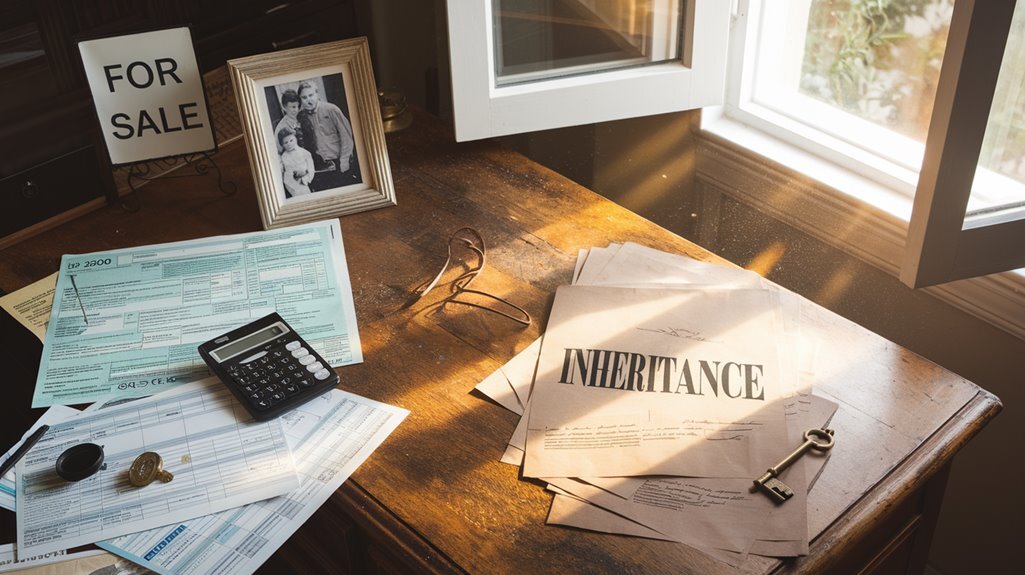Inheriting a house brings a mix of emotions and responsibilities. You might feel overwhelmed with questions about taxes and financial obligations.
When family members pass away, understanding the tax implications of their inherited property becomes crucial. Many people struggle with understanding if they need to pay taxes.
We understand your concerns about making costly tax mistakes with inherited property. You might worry about unexpected tax bills or missing important deadlines.
If you make wrong decisions, you could face significant financial consequences. The sale of an inherited house is taxable, but only on the profit made since the date of inheritance. This blog will walk you through the tax rules for inherited properties.
We will help you understand your obligations and make informed decisions. This guide provides clear steps to navigate inheritance tax regulations and protect your financial interests.
Key Takeaways
- The sale of an inherited house is taxable only if you sell it for more than its stepped-up basis value at inheritance.
- Capital gains tax applies to profits made above the property’s fair market value at the time of inheritance.
- Federal inheritance tax doesn’t apply to inherited houses, though some states may charge inheritance taxes separately.
- Short-term sales after inheritance typically result in minimal capital gains tax due to the stepped-up basis rule.
- Selling below the stepped-up basis value can qualify as a capital loss and may not trigger any tax liability.
Is the Sale of an Inherited House Taxable?

The sale of an inherited house affects your taxes through specific capital gains rules. You will pay taxes only on gains that occur after the previous owner’s death. This happens because inherited properties get a “stepped-up basis” at death. The stepped-up basis equals the home’s fair market value when you inherited it.
We need to separate inheritance tax from capital gains tax for better understanding. While states may charge inheritance tax, the federal government does not. You must find the difference between your sale price and stepped-up basis.
If you sell soon after inheritance, your tax bill might be very small. The short time frame rarely allows for significant value increases. So, many sellers end up paying little or no capital gains tax.
This tax calculation method benefits people who inherit property. You can avoid large tax bills by understanding these special inheritance rules. Hence, proper timing of your sale could help reduce your tax burden.
What Does Inherited Property Mean?

Inherited property means assets you receive after someone’s death through legal processes. You can get these assets through a will, trust, or state inheritance laws.
When someone dies, their property passes to the new owners through different legal channels. The law gives you full ownership rights and responsibilities for the inherited property. You will get a “stepped-up basis” value based on the property’s worth at death. This value helps determine future tax implications if you decide to sell.
If you inherit through a will, the property must go through probate court first. However, properties in living trusts can transfer directly to new owners. You can choose to live in, rent out, or sell the inherited property. The law allows complete freedom in deciding what to do with your inheritance.
Are Inherited Homes Taxable at Sale?

Inherited homes are taxable when you sell them based on specific capital gains rules. You will pay taxes on the profit between your sale price and inheritance value. The stepped-up basis rule helps reduce your tax burden significantly.
This tax advantage means you won’t owe money on value increases during the original owner’s lifetime. If you inherit property, you should know about state-level inheritance taxes. While some states collect inheritance tax, the federal government focuses on capital gains taxation.
You need to establish the property’s value at inheritance time for tax purposes. A professional appraiser can help determine this crucial baseline value. This documented value will serve as your starting point for future tax calculations.
When you decide to sell, your tax bill depends on accurate inheritance-time valuations. If you keep good records, you can minimize your tax obligations. We recommend consulting a tax professional for specific guidance on inherited property sales.
What Types of Taxes Apply?
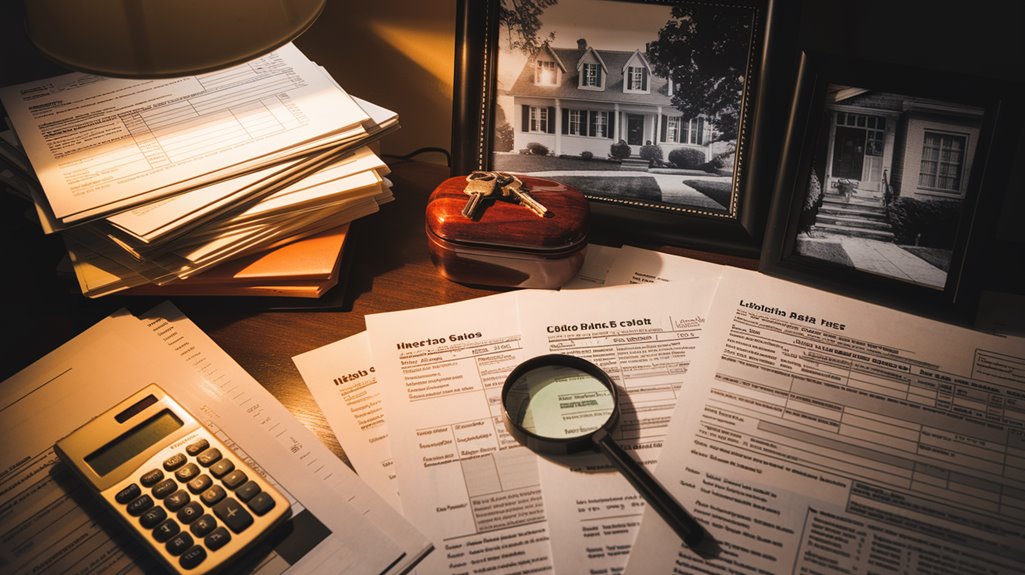
Different taxes affect your inherited house when you receive or sell it. You must pay federal capital gains tax when selling an inherited property. This tax applies to profits between the inheritance value and sale price. Some states will require you to pay inheritance tax right after getting the property.
If you sell the house, local transfer taxes will also come into play. The property’s stepped-up basis will determine your final tax amount. Your state’s inheritance laws might offer some tax breaks or exemptions.
So, understanding these taxes will help you plan the sale better. You can reduce your tax burden if you time the sale correctly. We recommend consulting a tax professional for specific guidance about your situation.
Your location and specific circumstances will shape your tax obligations. Since tax laws change often, it’s important to stay updated on current regulations.
How Is the Value of an Inherited House Determined?

A professional appraisal determines the value of an inherited house at the time of death. This process establishes the property’s “stepped-up basis” for tax purposes. You will need this value to calculate any future capital gains tax.
Since accuracy is crucial, a qualified inheritance appraiser must evaluate the property. The expert will look at several key factors during the assessment. These factors include the home’s location, size, and overall condition. They will also review recent sales of similar properties in the area.
If you want extra assurance, you can get a second opinion from a real estate agent. However, the official appraisal report remains the primary document for tax purposes. When the process is complete, you will receive a detailed report with the valuation. This documentation helps establish your new cost basis for the inherited property.
When Are Capital Gains Taxes Imposed?
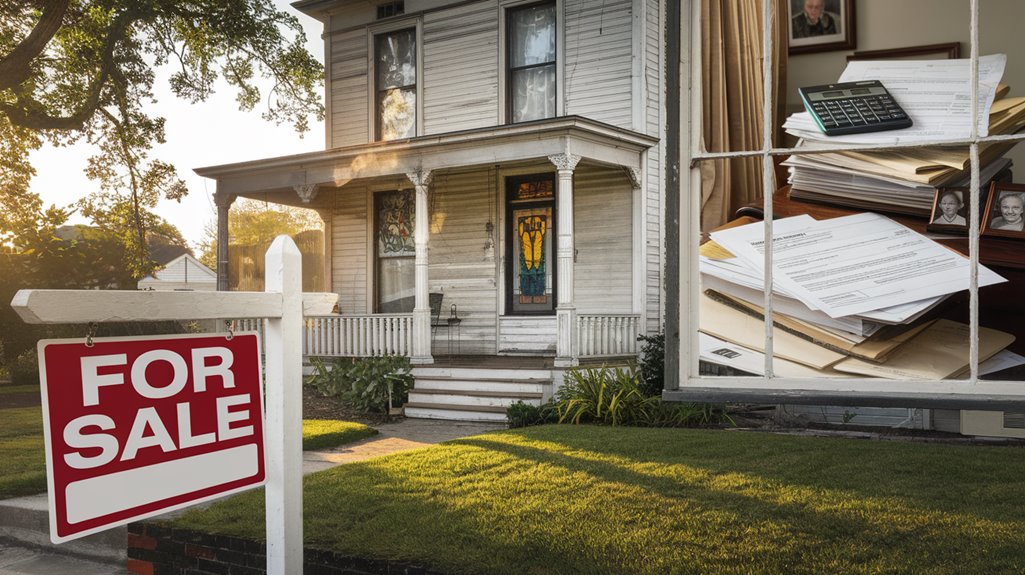
Capital gains taxes become payable when you sell an inherited house above its stepped-up basis value.
You must pay these taxes under three main conditions:
- The selling price exceeds the property’s fair market value at the previous owner’s death.
- You have added improvements that boost the property’s value beyond its basis.
- The property value has increased during your ownership.
If you sell within a year, the IRS will apply short-term capital gains rates. You can benefit from lower long-term capital gains rates after holding the property longer. This tax structure depends on your holding period and financial situation.
The stepped-up basis helps reduce your potential tax burden on inherited property. When you make improvements, they will affect your final tax calculations. So, timing your sale carefully can lead to significant tax savings. If you plan to sell quickly, you should consider the higher short-term rates.
Do You Pay Capital Gains Taxes?
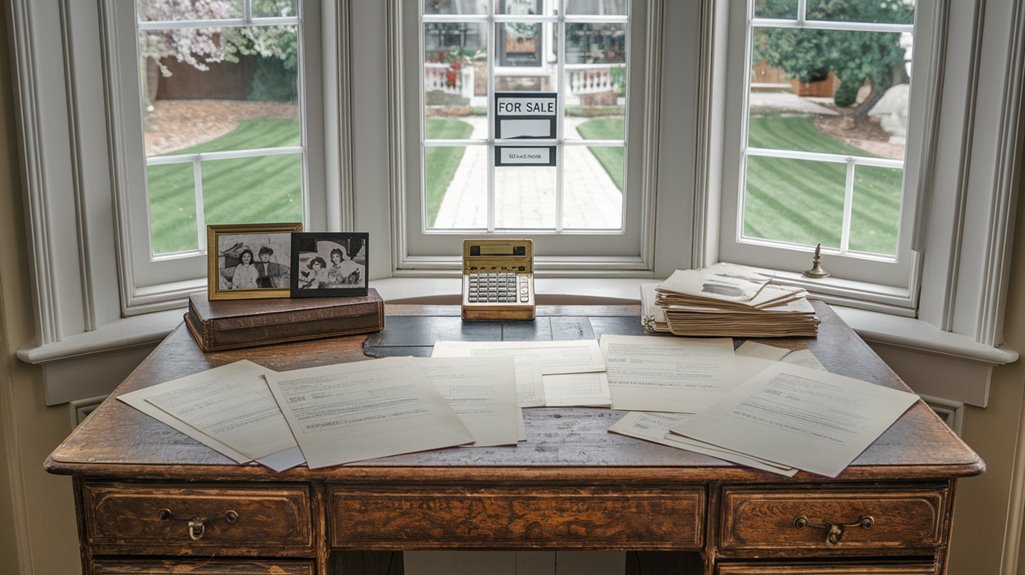
Capital gains taxes on inherited houses depend on when and how you sell the property. You will need to understand the stepped-up basis value for tax calculation purposes. This value represents the property’s fair market worth when the original owner died. If you sell above this value, you must pay capital gains taxes. However, you won’t owe taxes when selling at or below the stepped-up basis.
The tax rules offer some flexibility for inherited property owners. You could avoid significant taxes through careful planning and timing. When you live in the house as your primary home, special tax benefits apply. If you stay there for two years, you may qualify for tax exclusions. Single filers can exclude up to $250,000 in gains. Married couples who file jointly can exclude up to $500,000 from capital gains taxes.
How to Calculate Capital Gains Tax?
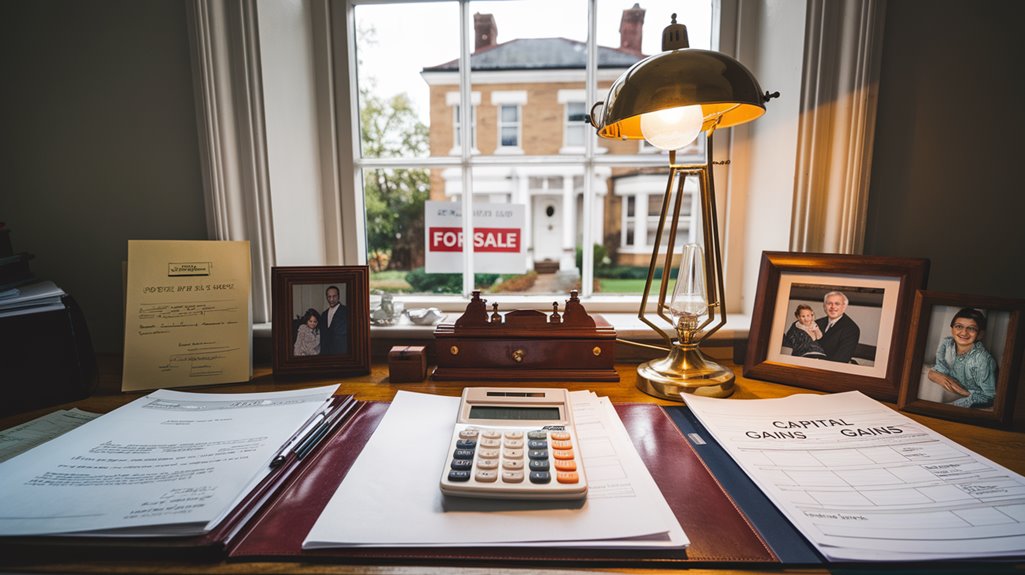
Capital gains tax calculation requires understanding three main elements: basis value, sale price, and tax rate. You need to start with the stepped-up basis value of your inherited house. This value represents the property’s fair market worth when you inherited it.
To find your capital gain, subtract the stepped-up basis from your sale price. If you have made improvements, they will increase your basis amount. Your tax rate depends on your current income bracket and filing status. The rates usually fall into three categories: 0%, 15%, or 20%.
When you sell an inherited house, proper documentation becomes essential for tax purposes. If you keep detailed records, you will avoid problems during IRS reviews.
So, the final tax amount comes from multiplying your net gain by your tax rate. We recommend consulting a tax professional for complex inheritance situations.
You should always save receipts and documents related to property improvements. Since these costs affect your total tax obligation, accurate records matter.
While this process might seem complex, breaking it into steps makes it manageable. Hence, following each step carefully will ensure accurate calculations.
Can You Avoid Taxes on Inherited Property?
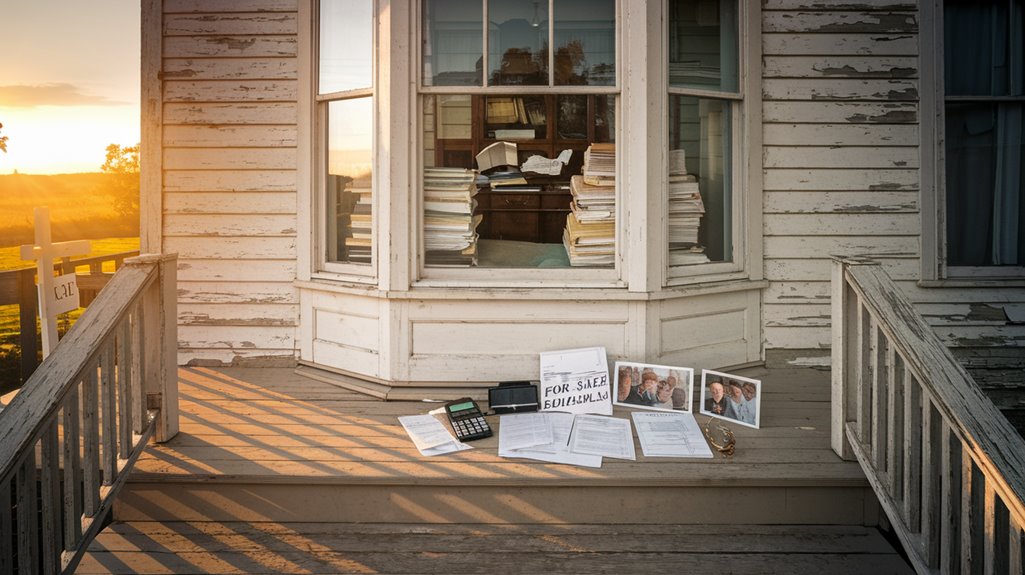
You can lower taxes on inherited property through several proven methods and careful planning. The “step-up” basis helps you minimize taxes by adjusting the property’s value at inheritance. You’ll get tax benefits if you make the inherited property your main home. You can save up to $250,000 in capital gains taxes as a single person. This amount doubles to $500,000 for married couples filing jointly.
When your yearly income is lower, you should consider selling the property. So, you will stay in a lower tax bracket and pay less. You can increase your cost basis by keeping records of property improvements. This strategy will reduce your taxable gains after selling the property.
Since tax laws often change, you should consult a tax professional for guidance. If you plan carefully, you will maximize your tax savings on inherited property.
Can You Sell an Inherited Home As-Is?

You can sell your inherited property as-is without making any changes or fixes. This option lets you transfer ownership in the home’s current state. If you choose this path, you won’t need to spend money on repairs.
The condition of your inherited home affects the sale in three ways:
- You will mainly attract investors and buyers looking for renovation projects
- The price will be lower due to needed repairs
- You must tell buyers about any problems you know about
While this method saves time and money upfront, you should take some precautions. A professional inspection will help you set the right price. This step also builds trust with potential buyers.
If you decide to sell as-is, you should prepare for a smaller buyer pool. The final sale price will reflect all necessary repairs and updates. When buyers know what needs fixing, they can make informed decisions.
How Does Selling As-Is Impact Taxes?
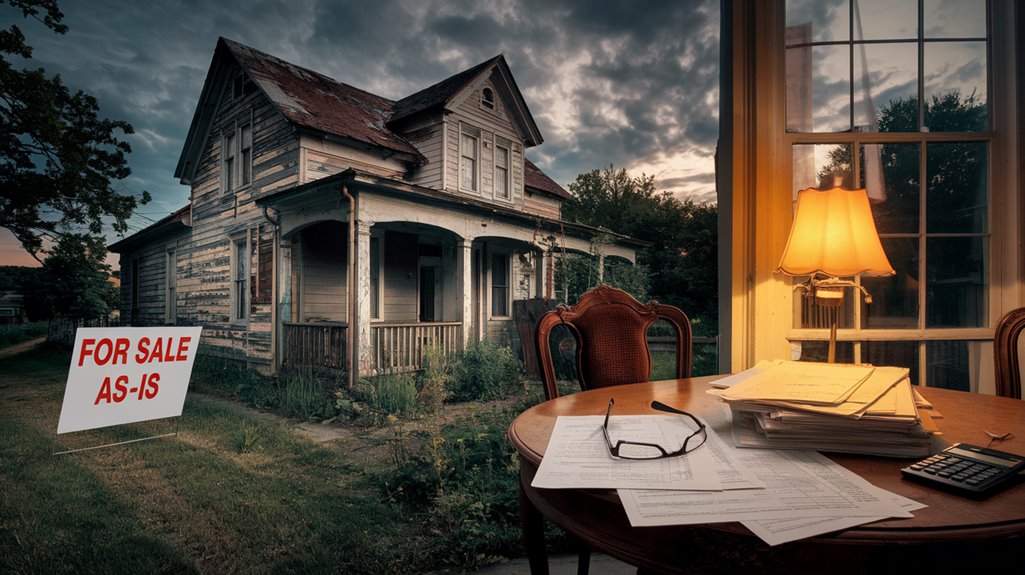
Selling a house as-is has specific tax rules that follow standard property sale guidelines. You must understand these tax implications before making your decision.
The condition of your property doesn’t change how the IRS calculates capital gains taxes. When you inherit a house, your tax basis equals its fair market value. This value is set on the date when the previous owner passed away.
You could qualify for a capital loss if you sell below the stepped-up basis. Yet if the sale price exceeds this basis, you will need to pay taxes. You should get a professional appraisal to determine the property’s value at inheritance.
So the final sale price will affect your total tax liability, not the as-is status. While selling as-is might lead to a lower price, your tax calculations remain unchanged. This means you could potentially reduce your tax burden if the sale price drops significantly.
If you keep proper documentation, you can better manage your tax obligations. Hence, it’s wise to consult with a tax professional about your specific situation.
Should You Sell Your Inherited House Fast?

Selling an inherited house quickly can impact your financial future in significant ways. You must understand several key factors before making this important choice.
The real estate market plays a vital role in your decision to sell fast. If you sell too quickly, you might miss out on future property value increases.
You should examine these key points before deciding:
- Market conditions – You can lose money if you sell during unfavorable market periods
- Monthly costs – Your inherited property needs regular payments for maintenance and taxes
- Personal feelings – If you rush to sell, emotions might cloud your judgment
We understand that property management isn’t suitable for everyone. You might need quick cash for various reasons.
So, if you face any of these situations, a fast sale could work:
- You live far from the inherited property
- The house needs extensive repairs
- You can’t afford the monthly expenses
But you must remember that quick sales often bring lower profits. If you wait longer, you might get better returns on your inheritance. This decision requires careful thought and proper planning. You can consult a real estate expert to understand your options better.
When market conditions are good, your inherited property could become a valuable investment. Hence, taking time to evaluate all choices will lead to better results.
Is Selling an Inherited House to a Cash Home Buyer Worth It?
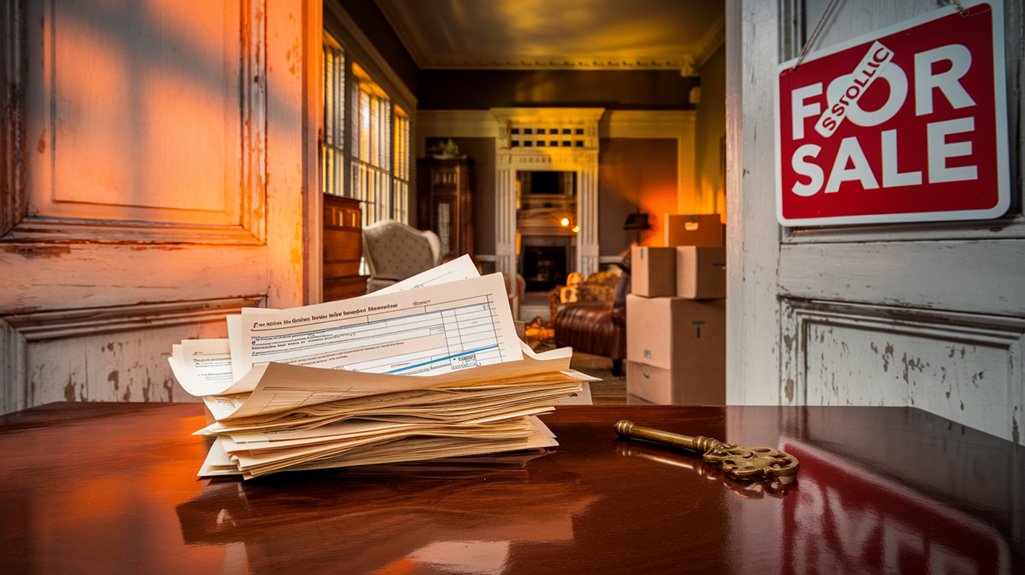
A cash home buyer can be a practical solution for selling an inherited house. You must weigh the benefits of speed against lower profits. These buyers will eliminate the need for real estate agent fees. They also help you avoid spending money on repairs.
If you choose a cash buyer, you won’t deal with home inspections. You can skip the hassle of multiple house showings. The closing process takes only days instead of months.
But cash buyers often offer prices below market value. This difference typically ranges from 10% to 30% less than traditional sales. You will save money on property taxes during the selling period. Insurance and maintenance costs also decrease with a faster sale.
When the house needs major repairs, a cash sale becomes more attractive. This option works well if the property has tax liens. Your financial situation should guide your final decision. The local real estate market can affect the value of cash offers.
If you need quick access to money, cash buyers provide immediate solutions. So you must calculate whether speed matters more than maximum profit. The condition of your inherited property will influence this choice.
Sell Your House As-Is to Limitless Homes of KC

Limitless Homes of KC offers quick cash purchases for inherited houses in Kansas City. We buy properties as-is throughout Platte Mo, Smithville, Kansas City.
You can avoid repairs when selling your inherited house to us. If you work with us, we will handle all paperwork related to inherited properties. Our process eliminates realtor fees and extra costs typically associated with traditional sales.
We understand the challenges of managing inherited properties. Our team has experience with various inheritance cases and multiple heir situations. If you need to sell quickly, we can close the deal according to your schedule.
When you contact us, we will:
- Assess your property without any obligations
- Present a clear cash offer
- Handle all required documentation
- Complete the sale on your timeline
Your inherited property deserves a simple selling solution. So we make the process easy and straightforward for property inheritors. You can reach out to Limitless Homes of KC today for a free cash offer.
